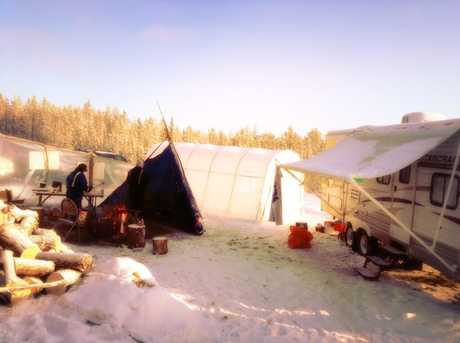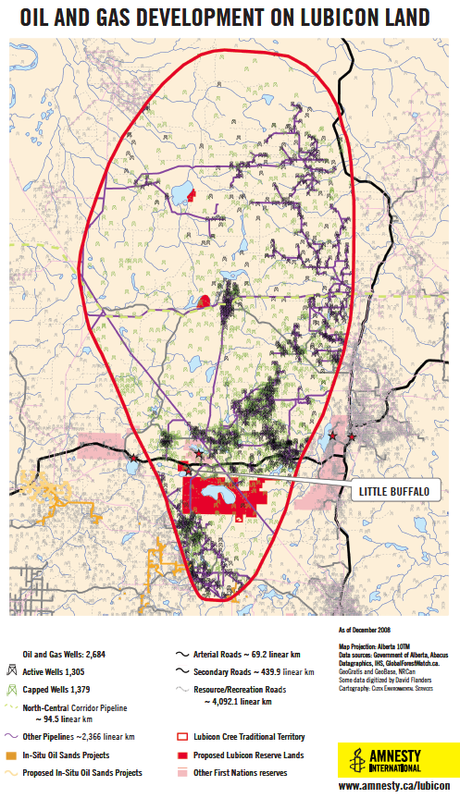by Jim Fromm / Seattle Free Press
Seattle, Occupied Duwamish Territory – December 17, 2013
This week, people have been blockading oil industry equipment from Oregon to Alberta. Near Haig Lake in northern Alberta, the Lubicon Lake Nation is evicting oil and gas companies and using roadblocks to prevent extraction. Meanwhile, Warm Springs and Umatilla tribal members and environmental groups are slowing down a forty-story-tall megaload from the Port of Umatilla, Oregon, with lock-downs and human blockades. Last night, four people locked-down to two barricades near John Day, Oregon. They and 13 supporters and bystanders were arrested, 16 of whom remain incarcerated. Rising Tide is asking for donations to a legal fund for bail here. The megaload is an evaporator for an Alberta oil refinery, designed by General Electric subsidiary RCCI and shipped by Omega Morgan. Since the megaload’s arrival, Rising Tide groups have also protested RCCI and Omega Morgan offices in Hillsboro, Oregon, Bellevue and Fife, Washington.
Operation FrackOFF
On November 21st, the Lubicon Lake Nation delivered an eviction notice for trespass to Penn West Petroleum Ltd. The company ignored the notice, and on November 26th Lubicon Cree occupied the road to a Penn West oil hydraulic fracturing (“fracking-for-oil”) site. Penn West has drilled 60 wells in the area, among the 2,600 oil and gas wells leased by the provincial government of Alberta on traditional Lubicon Cree land.
The Northern Journal of Alberta reports:
Lubicon communications coordinator Garrett Tomlinson said the growing group of protesters has decided unanimously that no one is moving until the company addresses their concerns…those engaged in the 24/7 blockade are now working in shifts to get a break from the cold and see their families, and are receiving caravans of supplies from outside the community. They now have a fully fledged camp set up, complete with tents, a large canvas shelter and a school bus, as opposed to a line of trucks.
A social media campaign is asking for everything from winter clothing to fuel, food and water.
‘It’s turned into quite the traffic jam. Even if all the people left, there’d be some serious deconstruction for the oil company to go in and try to take everything out,’ Tomlinson said.
Security from Penn West park their vehicles at the blockade from 9:00 a.m. to 5:00 p.m. in a silent face off with protesters holding the road in check round the clock.
‘There haven’t been any confrontations. Their security personnel come and sit at one end of the road and our guys obviously aren’t moving, and that’s pretty well where they leave it,’ Tomlinson said, adding that there have not been any more incidents of the blockade being ‘run at’ by Penn West equipment, as was recorded on video by Lubicon protesters in the first days of the blockade.”
 The Lubicon Cree are preparing a second roadblock after discovering Penn West moving equipment and personnel two kilometers south to another oil lease site. On December 13th, the Lubicon Lake Nation announced trespass and eviction notices for four more oil and gas companies: Mancal Energy Inc., Lonepine Resources Inc., Harvest Operations Corp., and Trinidad Drilling Ltd. The Lubicon Lake Nation campaign, “Operation FrackOff,” began five months after the latest in a series of oil spills on traditional Lubicon Cree land.
The Lubicon Cree are preparing a second roadblock after discovering Penn West moving equipment and personnel two kilometers south to another oil lease site. On December 13th, the Lubicon Lake Nation announced trespass and eviction notices for four more oil and gas companies: Mancal Energy Inc., Lonepine Resources Inc., Harvest Operations Corp., and Trinidad Drilling Ltd. The Lubicon Lake Nation campaign, “Operation FrackOff,” began five months after the latest in a series of oil spills on traditional Lubicon Cree land.
Yesterday, a Calgary judge granted an injunction against the Lubicon Cree blockades. The Lubicon Lake Nation responded with a call for international attention to the situation. Chief Bernard Ominayak commented, “This is yet another example of what the United Nations has already ruled in the Lubicon case. We as people do not have effective redress in the Canadian legal and regulatory system and it is actively being used as a tool to exterminate us in favor of natural resource development.”
Amnesty International summarizes:
Territory that the Lubicon have relied on to hunt, fish and trap is now crisscrossed by more than 2400 km of oil and gas pipelines. In 2011, one of these pipelines spilled an estimated 28,000 barrels of crude oil into wetlands near the Lubicon community of Little Buffalo. It was one of the largest oil spills in Alberta history…the federal and provincial governments have used their own failure to provide legal recognition of Lubicon lands as an excuse for excluding the Lubicon from decision-making over development in their lands and from a fair share in the revenue that has been generated.
The Alberta government [acknowledges] that it has brought in vast wealth from development of Lubicon land…
Today, more than 70% percent of Lubicon territory has been leased for future resource development, including oil sands extraction.
United Nations human rights bodies have repeatedly condemned the failure to protect Lubicon rights from the impact of large-scale oil and gas development.”
Like a camel through the eye of a needle
Exploiting Alberta’s oil fields and Tar Sands requires massive equipment, much of it manufactured in Asia, shipped to the West Coast, and trucked through the Rocky Mountains—the megaloads. The Nez Perce tribe used human blockades and legal action to halt megaload shipments through their region, forcing the oil industry to try to find a new route. However, people throughout the region are refusing to allow their lands to become an industrial corridor for destructive fossil fuel extraction. Two judges have issued injunctions against the megaloads shipments so far, for Nez Perce land and for Idaho Highway 12, raising the question—if the megaloads have been found unsafe by two courts, how are they safe anywhere?
The General Electric megaload en route, a forty-story-tall evaporator bound for an Alberta oil refinery, left the Port of Umatilla, Oregon, on December 1st, and has traveled only 165 miles in half a month (“Megaload traveling megaslowly,” quipped the Idaho Statesman).
Earth First! Newswire reports on the December 16th blockades:
Arrestees confirm reports of pain compliance techniques used in the dismantling of this blockade. According to bystanders, the police lifted and pulled the trailer, and the person locked to the axle was dragged on the ground. Another individual had her jacket sleeves cut off, which caused her to be exposed to the extreme cold while she was locked down.
All photographers and videographers on the scene were arrested, so our promises of photos and videos may take a little while to get fulfilled.”
The megaload has 1,040 miles to go to the Canadian border, and activists are bracing to slow or stop it throughout the route. Two more megaloads are waiting at the Port of Umatilla. From Umatilla to Little Buffalo, blockades are succeeding in spite of snow and freezing temperatures; in slowing or stopping oil industry transport, Native and environmental activists are even making winter conditions their ally.
Since the megaload arrived in Umatilla, Rising Tide groups have protested General Electric/RCCI’s office in Bellevue, Washington, and Omega Morgan’s offices in Hillsboro, Oregon, and Fife, Washington. Rising Tide North America is asking folks to call Omega Morgan and demand they stop shipping oil industry megaloads. Omega Morgan CEO John McCalla’s phone number is 503-647-7474, and Omega Morgan press spokesperson Holly Zander’s phone number is 503-360-7144.
“NEVER LET OUR LAND DIE,” promises one Lubicon slogan.

